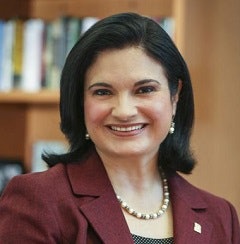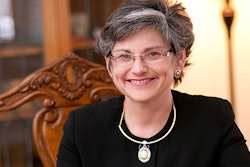As public discourse increases around issues of equity getting into college, succeeding there and landing a good job after, some researchers are studying racial disparities in often-overlooked areas such as study abroad.
White students are the overwhelming majority of American college students who travel internationally to study at some point during their college education, an adventure that personally enriches, adds an impressive line to a resume and often translates into academic cache before graduation.
According to the 100-year-old Institute of International Education (IIE), 70.8 percent of U.S. college students who studied abroad in 2016-17 were White. Among ethnic and racial minority students, Hispanics were highest at 10.2 percent, Asian and Pacific Islanders constituted 8.2 percent and African-American students were 6.1 percent.
 Dr. Lenore Rodicio
Dr. Lenore RodicioMeanwhile, students self-identifying as multiracial were 4.3 percent. American Indian and Alaska Native students were barely represented at .4 percent.
IIE data going back to the 2005-06 academic year, however, indicate that the racial gap has narrowed as the number of students studying abroad has steadily climbed. Over the 12-year period, the percentage of White study abroad students steadily decreased from 83 percent – down almost 13 percentage points – as the number of students studying abroad rose from 223,534 to 332,727.
Hispanic participation increased, nearly doubling as a percentage, while Asian/Pacific Islander, Black and multiracial percentages also rose. The only minority group that declined was American Indian/Alaska Native, which decreased from .6 percent to .5 percent in 2006-07, holding steady until dropping to .4 percent in 2016-17.
Helping to reduce the disparities are increased efforts by Hispanic serving institutions (HSIs), historically Black colleges and universities (HBCUs) and other minority serving institutions (MSIs) that promote study abroad opportunities for underserved students.
Miami Dade College is among MSIs at the forefront of such efforts. Multiple programs helped 146 students at the community college study abroad in the 2016-17 academic year, with 93 percent from underrepresented groups, said Dr. Lenore Rodicio, executive vice president and provost.
“Studying abroad is an opportunity that we think is critical for our students’ growth,” she said. “For many who go, it is their first place ride. Some have never been out of the country. It is a really enriching experience for them.”
One of the HSI’s international study initiatives, in partnership with Miami-based Educate Tomorrow, specifically serves students from foster care and homeless backgrounds.
And, like typical study-abroad programs, students earn college credit and can pay some of the costs with financial aid. Typically, scholarships are available – sometimes competitive – and program directors help students find other resources to defray costs.
“It’s rare to see community colleges focus so heavily on study abroad,” said Rodicio, “but it’s something that we’ve really made a priority for our students.”
Such a priority, in fact, that the IIE’s annual Open Doors report in 2014-15 ranked Miami Dade College as first in Florida and seventh in the nation among community colleges based on duration of study-abroad opportunities.
 Dr. Keshia Abraham
Dr. Keshia AbrahamMany students who study abroad describe the experience as transformational, with lower-income students of color in particular noting significant personal and academic meaning as a result of an opportunity that typically seems out of reach for them. Similar to traditional perceptions about college, many students of color think study abroad is for affluent White people – or simply not for minorities, especially those with modest financial means, Dr. Keshia Abraham has observed.
Abraham is among those helping to change student perceptions and statistical realities regarding study abroad. As director of strategic initiatives for the nonprofit Council on International Educational Exchange (CIEE), she promotes programs and initiatives nationwide that throw open the doors of study abroad and help underrepresented students walk through them.
The agency’s three pillars address historic barriers to study-abroad access: cost, curriculum and culture. One effort is the Frederick Douglass Global Fellowships program, a joint initiative with the Penn Center for Minority Serving Institutions at the University of Pennsylvania that annually awards 10 full scholarships for summer study abroad to students at MSIs.
Not only are many students of color the first in their families to attend college, Abraham said, but many are the first to travel in an airplane and the first to get a passport.
Obtaining a passport can be a major hurdle in the minds of underrepresented students, and CIEE addresses that through its Passport Caravan program. Abraham and her team have traveled to campuses across the nation and provided them with free passports – nearly 7,300 since 2014.
To support increased study-abroad offerings, the council added short-term study-abroad programs and aids numerous custom and faculty-led initiatives. In 2018, CIEE gave more than $8 million in study-abroad grants, scholarships and other financial aid, and covered airfare for all Pell grant-eligible students.
The work is a calling for Abraham, who first traveled abroad at the age of 12 when athletics took her to Sweden, Norway and Denmark for several weeks. The Pittsburgh native went on a nine-week exchange to Italy at the age of 16, and while matriculating at Spelman College she studied abroad in Zimbabwe. Fulbright programs later took her to India, Jamaica, Trinidad and Tobago, and academic research later allowed her to visit even more foreign countries.
In 2017, Abraham left her position as dean of the School of Arts and Sciences and chair of the humanities department at Florida Memorial University and went to work for CIEE – to help college students of color enjoy the same experiences she relished as a student.
“I realized that most of our students still don’t know that these opportunities are for them,” she said. “But the way we market to them and provide services, we make it clear it’s about them.
“We’re trying to change the perceptions about why it matters. It’s a vital part of the college experience. You’ve not graduated in your life experiences until you’ve studied abroad. It’s not just about the trip, about travel – it’s learning more about yourself and what is possible for you.”
LaMont Jones can be reached at [email protected]. You can follow him on Twitter @DrLaMontJones



















